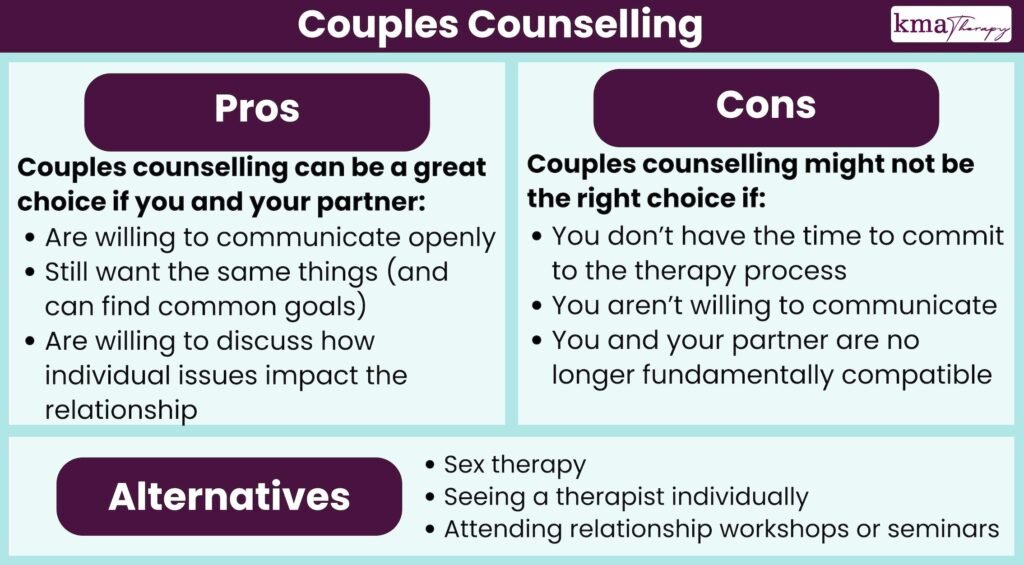Introduction:
How much does couples counseling cost typically range from $75 to $200 per session, with various factors influencing the price.
Couples counseling, often referred to as marriage counseling or relationship therapy, is an invaluable resource for couples experiencing difficulties or seeking to strengthen their bond. However, like any professional service, couples counseling comes with a cost, which can vary widely depending on several factors.
In this article, we’ll explore the typical costs associated with couples counseling, what influences these costs, and how couples can find affordable options.
How much does couples counseling cost?
The cost of couples counseling can vary widely depending on several factors, including location, the therapist’s qualifications, and the duration of the sessions. On average, couples counseling sessions can range from $75 to $200 per hour. In some areas, especially in larger cities or regions with a higher cost of living, rates can be higher, sometimes exceeding $250 per session.

1. Therapist’s Qualifications and Experience:
Licensed therapists, psychologists, or psychiatrists typically charge more than counselors without advanced degrees. A highly experienced therapist with specialized training in couples counseling might charge $150 to $250 per hour.
2. Location:
The cost of counseling can vary depending on the city or region. Urban areas with higher living costs often see higher counseling fees. For example, couples in major cities like New York or Los Angeles may pay more than those in smaller towns.
3. Session Length:
Standard counseling sessions last between 45 to 60 minutes. Some therapists offer extended sessions of 75 to 90 minutes, which may cost more but could provide a more comprehensive therapeutic experience.
Insurance and Sliding Scale Fees:
Some insurance plans may cover part of the cost of couples counseling, particularly if it’s related to a diagnosable mental health condition. However, coverage varies, and it’s important to check with both the therapist and your insurance provider beforehand.Many therapists offer sliding scale fees based on a couple’s income, making therapy more accessible for those with financial constraints. Sliding scale fees can reduce the cost to as low as $50 per session for qualified course.
Pros and Cons of Couples Counseling:

Couples counseling, also known as marriage or relationship therapy, is a valuable tool for many partners seeking to improve their relationship, navigate challenges, or address specific issues. Like any intervention, it comes with its set of advantages and potential drawbacks. Understanding these can help couples make informed decisions about whether counseling is right for them.
Pros of Couples Counseling:
1. Improved Communication:
- Enhanced Understanding
Counseling provides a structured environment for couples to express their thoughts and feelings openly, fostering better understanding between partners.
- Effective Communication Skills:
Therapists teach couples techniques to communicate more effectively, reducing misunderstandings and conflicts.
2. Conflict Resolution:
- Identifying Root Causes:
Counseling helps couples identify underlying issues that contribute to conflicts, enabling them to address problems at their
- Healthy Dispute Resolution:
Couples learn strategies to handle disagreements constructively, minimizing the escalation of conflicts.
3. Strengthening the Relationship:
- Rebuilding Trust:
For couples experiencing breaches of trust, such as infidelity, counseling can facilitate the rebuilding of trust and forgiveness.
- Enhancing Emotional Connection:
Therapy encourages partners to reconnect emotionally, fostering a deeper bond and intimacy.
4. Personal Growth:
- Self-Reflection:
Individuals gain insights into their own behaviors, triggers, and patterns, promoting personal growth alongside relationship improvement.
Understanding each other’s perspectives can lead to increased empathy and compassion within the relationship.
5. Support During Transitions:
- Navigating Life Changes:
Couples counseling can provide support during significant life transitions, such as marriage, parenthood, career changes, or retirement.
- Managing Stressors:
Therapists help couples manage external stressors that may impact the relationship, offering coping strategies and resilience-building techniques.
6. Preventative Measure:
- Proactive Maintenance:
Couples can engage in counseling not only to resolve problems but also to maintain a healthy relationship proactively, preventing issues from escalatin
Cons of Couples Counseling
1. Cost:
- Financial Investment:
As discussed previously, couples counseling can be expensive, especially without insurance coverage. This financial burden may be a barrier for some couples.
- Time Commitment:
Regular sessions require time and commitment, which can be challenging for busy schedules.
2. Emotional Discomfort:
- Facing Difficult Issues:
Counseling often involves discussing painful or uncomfortable topics, which can be emotionally taxing for both partners.
- Vulnerability:
Opening up and being vulnerable in front of a therapist may be difficult for some individuals, potentially causing resistance or anxiety.
3. Variable Outcomes:
- No Guaranteed Success:
While many couples benefit from counseling, there is no guarantee of success. The effectiveness can depend on factors such as the willingness of both partners to participate and the quality of the therapist.
- Potential for Conflict Escalation:
In some cases, bringing issues to the surface in therapy can temporarily increase tension or conflict before improvements are seen.
4. Therapist Compatibility:
- Finding the Right Fit:
The therapeutic relationship is crucial. If couples do not feel comfortable or connected with their therapist, the effectiveness of counseling may be diminished.
- Bias or Inadequate Expertise:
Not all therapists have the same level of expertise or approach. A mismatch in therapeutic style or perceived bias can hinder progress.
5. Dependency Risks:
- Over-Reliance on Therapy:
Some couples might become overly reliant on therapy sessions for decision-making or conflict resolution, potentially neglecting to develop their own coping mechanisms outside of therapy.
6. Potential for Misuse:
- Unwilling Participation:
If one partner is unwilling or resistant to participate fully, counseling may become less effective and could even exacerbate existing issues.
- Unrealistic Expectations:
Entering counseling with unrealistic expectations about quick fixes can lead to disappointment and frustration if progress is gradual.
Is Couples Counseling Worth the Cost?
Investing in couples counseling can lead to long-term benefits for your relationship, helping you navigate challenges, enhance communication, and build a stronger bond. While the cost may seem significant, many couples find the experience invaluable in fostering a healthier, happier relationship.
Ultimately, the cost of couples counseling varies based on numerous factors, but there are ways to make it more affordable. If your relationship is facing challenges, the potential benefits of counseling may outweigh the financial investment, leading to lasting positive changes.
Certainly! Here are some questions about couples counseling costs along with their answers:
Q1. What factors influence the cost of couples counseling?
The cost of couples counseling is influenced by several factors, including location, the therapist’s experience and credentials, the duration and frequency of sessions, and whether the sessions are in-person or online. Urban areas with a higher cost of living generally have higher therapy rates, while therapists with specialized training may charge more for their services.
Q2. How much does couples counseling typically cost?
On average, couples counseling can range from $75 to $200 per hour. In some cities or areas with a higher cost of living, sessions can exceed $250 per hour. Online counseling is often more affordable, with rates typically ranging from $50 to $150 per session.
Q3. Is couples counseling covered by insurance?
Insurance coverage for couples counseling varies. Some insurance plans do cover it, but it’s essential to check with your provider to confirm whether it’s included and if the therapist is in-network. Even if covered, co-pays or deductibles may still apply.
Q4. Can sliding scale fees make couples counseling more affordable?
Yes, many therapists offer sliding scale fees based on your income.
This means the cost of counseling is adjusted according to your financial situation, making it more affordable for those with lower incomes.
Q5. Are there additional costs associated with couples counseling?
In addition to session fees, there may be other costs such as initial assessment fees, which can range from $100 to $300, and cancellation fees if you miss an appointment without proper notice. These extra costs can add to the overall expense of counseling.
Q6. How does the duration and frequency of sessions impact the cost?
The length and frequency of sessions will directly impact the total cost. Standard sessions usually last 50-60 minutes, but some therapists offer longer sessions at a higher rate. More frequent sessions will increase the overall cost of counseling.
Q7. How does online counseling compare in cost to in-person sessions?
Online counseling tends to be more affordable than in-person sessions. Online rates typically range from $50 to $150 per session, offering a more budget-friendly option without the added costs of travel and the convenience of flexible scheduling.
Q8. What are some ways to reduce the cost of couples counseling?
There are several ways to make couples counseling more affordable, including using community resources, employee assistance programs (EAPs), or seeking services at university clinics where counseling students provide therapy at a reduced rate. Group therapy sessions can also be a less expensive option.
Q9. Are there benefits to investing in couples counseling despite the cost?
Yes, couples counseling can provide significant long-term benefits, such as improved communication, conflict resolution, and a stronger relationship. For many couples, the positive impact on their relationship is well worth the financial investment.
Q10. What should you consider when choosing a couples counselor based on cost?
When choosing a couples counselor, consider the balance between cost and quality. While it’s important to find a service within your budget, the therapist’s experience, specialization in couples therapy, and approach to counseling are also crucial factors that can affect the success of the therapy.
Conclusion:
Couples counseling offers numerous benefits, including improved communication, conflict resolution, and strengthened relationships. However, it also comes with potential challenges, such as financial costs, emotional discomfort, and the necessity of finding a compatible therapist.
Couples considering counseling should weigh these pros and cons carefully, keeping in mind that the success of therapy largely depends on the commitment and openness of both partners. When approached thoughtfully, couples counseling can be a powerful tool for fostering a healthier, more fulfilling relationship.
you must watch 👁️👁️ this article 👇👇👇
Psychotherapy Vs counseling. What is best medication?





